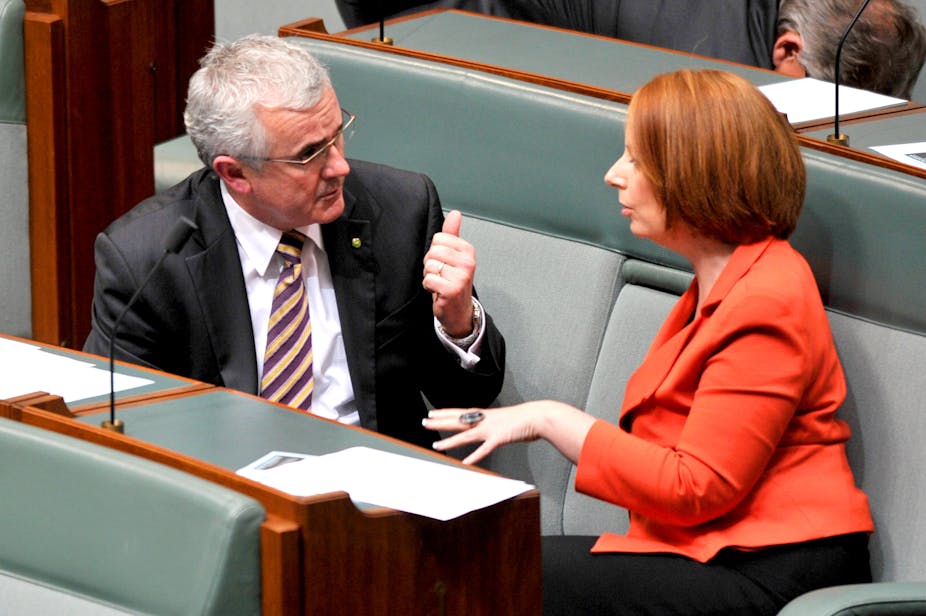As speculation about Prime Minister Julia Gillard’s commitment to gambling reform grows, Tasmanian independent Andrew Wilkie is weighing up the pros and cons of a compromise deal with the government.
Wilkie has previously said he will withdraw support from the minority government unless pokie reform is passed. But Gillard’s new numbers in the lower house, following the installation of Peter Slipper as Speaker, mean she can still govern without the cross-bencher’s support.
Gillard may propose a watered-down version of Wilkie’s original proposal, which will involve postponing legislation until 2016, and implementing a trial of Wilkie’s proposed pre-commitment technology in the ACT.
Wilkie has now said he will only strike a compromise deal with the government if trials are also slated for the New South Wales town of Queanbeyan, just outside Canberra.
The Conversation spoke with Macquarie University’s Dr Craig Mark about the fallout for the government, and for man-in-the-middle, Andrew Wilkie.
Is Gillard’s backdown on pokies legislation as simple as the fact she has more wriggle room since Peter Slipper was appointed Speaker?
Exactly. She can now afford not exactly to ignore Andrew Wilkie, but at least if the deal does fall down and if he does decide to withdraw support for her government, she does have that extra wriggle room. Ideally she should have some form of compromise to make sure Wilkie stays on board, because the numbers are still pretty tight if there’s something happening with Craig Thompson or some other MP falls under the proverbial bus or has to step down.
Do you think former Labor powerbroker Karl Bitar’s appointment by Crown Ltd last year could have anything to do with Gillard’s change of heart?
Cynics would make that connection, but in general, Labor MPs for marginal seats, particularly in New South Wales, have come under intense pressure from lobbyists for the gaming industry. Peter Garrett in particular for Kingsford Smith, as well as other MPs on the central coast and south coast. So anything that gives them some breathing space and reduces the pressure on them will be welcomed by those ALP members who are on very thin margins.
The short-term interests of the ALP might be slightly easier but it’s probably not going to help in the long-term because the pokie lobby, and Clubs Australia in particular, are always going to be opposing any form of pokie reform, including a trial, which is probably the compromise Gillard and Wilkie may head towards.
Does this backdown affect Gillard’s credibility?
It certainly gives Tony Abbott and the Opposition another weapon for them to use against Gillard and the government’s image of unreliability. They already have the line that it’s another broken promise and of course it doesn’t help her relations with the Greens since they’re also in favour of pokie reform. Anti-pokie campaigners such as Senator Nick Xenophon, Tim Costello and now GetUp will also continue to criticise the government.
While the government may be buying itself short-term space in defusing this issue, long-term it’s probably not going to help them. Particularly since out in the community there seems to be a lot of support for some sort of pokie reform. People are, in general, concerned about problem gambling so it’s not ultimately a good look for the government. It shows they’re not really willing to confront admittedly a very difficult issue. So it’s short-term gain for long-term expediency.
Where does all this leave Andrew Wilkie?
Well he faces a difficult position. Whether he backs down and compromises to get a much weaker deal – which he obviously would prefer not to have – or does he actually bite the bullet and make good on his threat to withdraw support from the government? Again, this would not bring down the government, they would still have the numbers for minority government in the parliament with the cross-benchers.
It’s hard to see how backing down would make him better off, since he’s not really in any position to switch support to Tony Abbott and the Coalition. That wouldn’t give the Coalition government, given the change in numbers and Peter Slipper. So he’s in a bit of a difficult position, Andrew Wilkie.
My feeling is he’ll probably back down in the promise of getting more reform later down the road, but again it’s just putting off difficult decisions further down the line, which doesn’t give the image of decisiveness, strength or good governing, really.
What role could the Greens play here? Could they still force Gillard’s hand on pokies?
Say there is a compromise deal which requires legislation, of course they [the Greens] control the balance of power in the Senate, so that’s where they might put more pressure on. They could insist on stronger amendments for pokie pre-commitment, particularly by having $1 limits – that’s the main sticking point. But again, if the government doesn’t want to go down that path under pressure from the pokie industry, well they’re stuck in stalemate.
The Greens could decide to make things more difficult for the government on other issues as well, such as their concern about logging in Tasmania, stronger action against Japanese whaling, welfare reform and a whole bunch of issues. Instability in the Senate in what’s going to be the year before an election doesn’t look good for the government’s image either.
How does this bode for politics in 2012?
It just shows the dire nature of politics for the start of the year. There’s a lack of will to pursue reform that could have some social good. But of course the Opposition and Tony Abbott are showing their “win at all costs” approach of negative Opposition tactics, just to emphasise the image of weakness for the government. It’s not an inspiring start for the political year.

